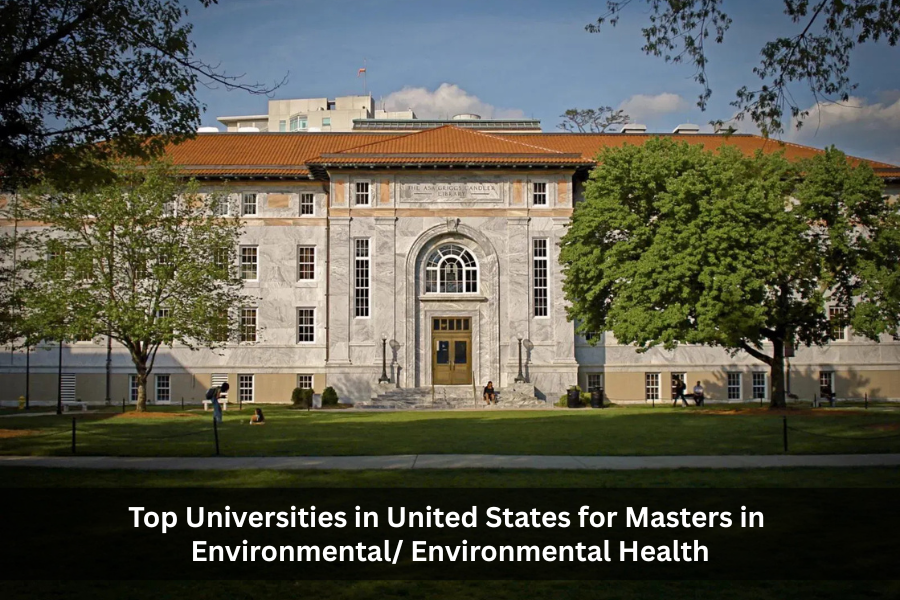
United States is a top choice for MS in Environmental/ Environmental Health applicants, offering renowned universities, diverse campuses, and excellent post-study work options. Its high quality of life and career opportunities make it an ideal study destination.
Here is the list of 5 Best MS inEnvironmental/ Environmental Health Universities in United States along with details of their course duration, fee, eligibility requirements and more:
1. Columbia University (United States)
Columbia University (officially as Columbia University in the City of New York) is a private Ivy League research university in New York City. Established in 1754 as King’s College on the grounds of Trinity Church in Manhattan, Columbia is the oldest institution of higher education in New York and the fifth-oldest institution of higher learning in the United States. It is one of nine colonial colleges founded before the Declaration of Independence, seven of which belong to the Ivy League. Columbia is ranked among the top universities in the world by major education publications.
Columbia University in the United States offers a 2-year STEM-designated MS in Earth & Environmental Engineering through the Fu Foundation School of Engineering and Applied Science. The program focuses on sustainable development and resource management. Tuition is USD 62,300 per year for both domestic and international students, with estimated living expenses around USD 37,900 annually.
2. University of Michigan (United States)
The University of Michigan (U-M, UMich, or simply Michigan) is a public research university in Ann Arbor, Michigan. Founded in 1817, it is the oldest institution of higher education in the state. The University of Michigan is one of the earliest American research universities and is a founding member of the Association of American Universities. In the fall of 2023, the university enrolled over 52,000 students.The university is classified among “R1: Doctoral Universities – Very High Research Activity”. It consists of nineteen colleges and offers 250 degree programs at the undergraduate and graduate level across various liberal arts and STEM disciplines.
The University of Michigan offers a 1.5-year STEM-designated Master of Science in Engineering (MSE) in Environmental Engineering through its College of Engineering. The program requires completion of 26 credit hours, with at least 18 credits from Civil and Environmental Engineering courses. Tuition is approximately USD 44,200 per year for domestic students and USD 76,000 per year for international students. Estimated annual living expenses are around USD 27,100, covering housing, meals, and personal costs.
3. University of Pittsburgh (United States)
The University of Pittsburgh (Pitt) is a state-related public research university in Pittsburgh, Pennsylvania. The university is composed of 17 undergraduate and graduate schools and colleges at its urban Pittsburgh campus, home to the university’s central administration and 28,391 undergraduate and graduate students. The 132-acre Pittsburgh campus includes various historic buildings that are part of the Schenley Farms Historic District, most notably its 42-story Gothic revival centerpiece, the Cathedral of Learning.
The University of Pittsburgh offers a 2-year STEM-designated Master of Public Health (MPH) in Environmental & Occupational Health through its School of Public Health. The program requires 47 credits, including coursework in environmental science, toxicology, exposure assessment, and a practicum experience . Tuition is approximately USD 30,900 per year for domestic students and USD 53,500 per year for international students . Estimated annual living expenses are around USD 18,400, covering housing, food, and personal costs .
4. University of Florida (United States)
The University of Florida is a public land-grant research university in Gainesville, Florida. It is a senior member of the State University System of Florida and traces its origins to 1853 and has operated continuously on its Gainesville campus since September 1906. The university is accredited by the Southern Association of Colleges and Schools (SACS). It is the third-largest Florida university by student population and is the fifth-largest single-campus university in the United States with 57,841 students enrolled during the 2020–21 school year.
The University of Florida offers a 2-year STEM-designated Master of Public Health (MPH) in Environmental Health through the College of Public Health & Health Professions. This 48-credit program emphasizes identifying and mitigating environmental risk factors affecting human health, with specialized coursework in toxicology and risk assessment. Tuition for domestic students is approximately USD 12,700 per year, while international students pay around USD 30,100 annually. Estimated living expenses are about USD 23,200 per year.
5. Emory University (United States)
Since 1836, Emory’s mission—to create, preserve, teach, and apply knowledge in the service of humanity—has guided the university in its work to drive discovery, serve the common good, and prepare leaders to make a difference in the world.
Emory University offers a 2-year STEM-designated Master of Public Health (MPH) in Environmental Health through the Rollins School of Public Health. The program requires 42 credit hours, including coursework in environmental health, epidemiology, and biostatistics, along with an applied practice experience and an integrative learning experience. Tuition is approximately USD 43,264 per year, totaling around USD 86,528 for the entire program. Estimated annual living expenses are about USD 27,684, covering housing, food, and personal costs.
If you’re planning to study in United States, check out our comprehensive guide covering everything you need to know from top universities and popular programs to career prospects, tuition fees, cost of living, scholarships, visas, and more.
 |
 |
 |
 |
 |
 |
 |
 |
